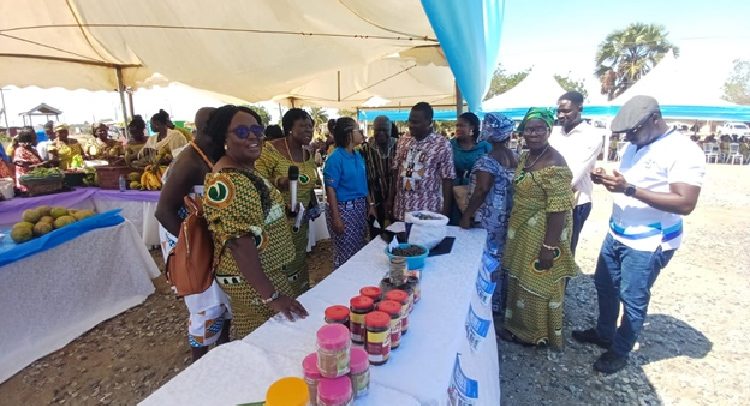A scene during the event
The Development Action Association (DAA), with support from the programme, “Sustainable Employment through Agribusiness (AgriBiz) in Ghana” (commissioned by the German Federal Ministry for Economic Cooperation and Development (BMZ) and implemented by GIZ) has commemorated the International Day of Rural Women (IDRW), at Kasoa Nyanyano.
The event emphasised issues affecting rural women such us as limited access to improved agricultural technologies and resources, affecting productivity and sustainability and encourage dialogue on solutions.
This year’s event, themed “Rural Women Cultivating Good Food for All”, put a spotlight the crucial role that rural women play in agriculture and food systems.
The event provided a platform for rural women to exchange knowledge, best practices, and engage with policymakers, stakeholders, and agricultural organizations.
Women account for a significant portion of the agricultural workforce in rural Ghana, contributing to food production, processing, and distribution thus its goal is to foster collaboration on sustainable agricultural technology, alleviate manual labor, and enhance food production in the country.
Deputy Head of Programmes; Sustainable Development Through AgriBiz (GIZ AgriBiz) Bashiru Fuseini, said the event marks the third time that GIZ AgriBiz is supporting the DAA to celebrate the day.
“We are especially proud to collaborate with the DA), which has been a partner since the inception of our program. AgriBiz is deeply committed to improving conditions that create sustainable employment in the agricultural sector, particularly for women.
This is a testament to our dedication to empowering rural women and ensuring that their contributions are recognized and supported,” he said.
IDRW
The International Day of Rural Women (IDRW) is celebrated annually to recognize the essential contributions of rural women in agriculture, food security, and rural development.
It highlights the vital role they play in food production, from farming to processing and distribution, while also addressing the unique challenges they face, such as limited access to resources and technology.
In Ghana, IDRW is especially significant as rural women form the backbone of the country’s agricultural sector, contributing to food security and economic growth.
A Daily Guide Report


